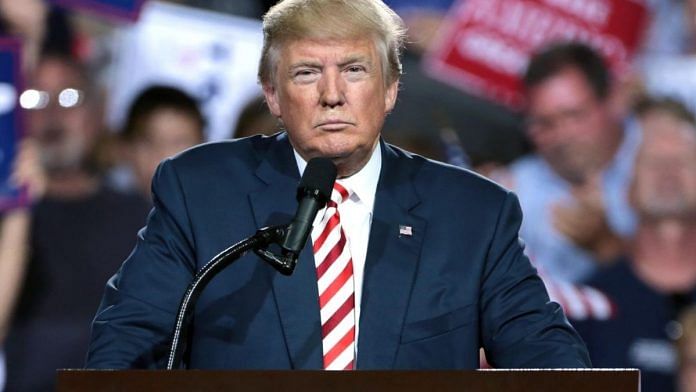New Delhi: The ‘Buy American first’ order signed by US President Donald Trump earlier this month will hardly impact Indian drugmakers, but will rather favour them, the country’s apex pharma export body has told the Narendra Modi government, ThePrint has learnt.
On 6 August, Trump had signed an executive order, directing federal agencies to prioritise purchasing domestically-manufactured selected drugs and medical materials.
The US is the largest market for India’s pharmaceutical industry and the impact of the order was first assumed to be huge on the Indian industry.
However, the Ministry of Commerce and Industry had asked its wing, the Pharmaceuticals Export Promotion Council of India (Pharmexcil), to submit comments based on their analysis of Trump’s decision.
“In the comments sent, Pharmexcil has told the MOC (ministry of commerce) that the order would hardly impact Indian drugmakers,” Udaya Bhaskar, Director-General of Pharmexcil, told ThePrint.
The Pharmexcil head said they have informed the ministry that “the government of the USA is looking for cost-effective medical supplies for the federal government procurement from domestic manufacturers”.
“The Executive Order on sourcing of essential drugs by the federal government would not have much impact on the generics supplied by India for the reasons of cost competitiveness as well as the negligible participation in the public procurement system,” he said.
The agency’s comments, which were submitted in the second week of August to the ministry, also highlighted the vital clause that prevents Indian products from falling under the ‘Made in America’ products’ bracket.
“Exemption clause (Sec 2 (f) (i) (3)) of the Executive Order states that ‘the provisions of local buying would not apply in case it causes the cost of procurement to increase by more than 25 per cent’,” said the copy of comments, seen by ThePrint.
“It would be favourable to India. It is estimated that manufacturing cost in India is 30-40 per cent less than that in developed countries like the USA,” the comments said.
“This clause indicates the exclusion of most of the low cost pharmaceuticals exported from India as the cost of manufacturing between India and US in terms of formulations is significant for a variety of reasons and India presents a great source of supply to the US.”
Also read: Indian drugmakers begin developing remdesivir, ‘world’s best shot’ against Covid-19
How can the clause favour India?
Bhaskar explained: “The clause will help India compete much better with other countries, who supply medical products to the US like European Union (EU) and China as India would safely fall in the bracket where the procurement cost is less by 30-40 per cent.”
Until now, Indian-origin generics constitutes 10 per cent of the US generic market in value terms.
“It is an opportunity for us where the remaining 90 per cent can also be targeted by Indian drugmakers,” he added.
Federal procurement already low
The agency has apprised the ministry of an important point in its comments that “the federal government procurements are already subjected to certain ‘US-made’ restrictions under the Buy American Act (BAA) and the Trade Agreements Act (TAA)”.
Since India is not a BAA and TAA-compliant country, “India’s share in US federal procurement is negligible”, the copy of the comments said. “Most of Indian-origin generics are catering to the USA private market and our share in the US generic market is about 10 per cent in value terms.”
However, India is still unclear about the list of medicines that America will decide to produce domestically.
The order issued in the first week of August directed the US drug watchdog, Food and Drug Administration (FDA), to produce a list of “essential medicines, medical countermeasures and critical input” to be produced domestically.
“Since the FDA is yet to identify the list of essential medicines, it is not even clear what drugs are covered under the order,” Bhaskar added.
In terms of production of bulk drugs — also known as active pharmaceuticals ingredients (APIs) — the agency has informed the government that the time and cost involved is “humongous and, therefore, switchover may not easily be possible except in case of fermentation and key starting material (KSMs) where India doesn’t participate at all”, said Bhaskar.
Also read: Indian drugmakers aren’t losing sleep despite getting a record 23 warnings from US FDA
Why is US market important for India?
According to the data by Pharmexcil, India’s exports to the US in 2019-20 stood at $6.74 billion, of which formulations (generics) exports were pegged at $6.25 billion.
Indian pharmaceutical industry has received more than 5,000 approvals from the US on new drug applications submitted by Indian drugmakers for exports as of April 2020.
The EO directs the federal government to buy certain drugs from American factories, while tasking the FDA with preparing an initial list of essential medicines, medical countermeasures and critical inputs.
The EO underscores ‘critical’ need to reduce dependence on foreign manufacturers to have reliable long-term domestic production and to minimise potential shortages.
Also read: Drugmakers want Modi govt to defer revision of essential medicines list, cite Covid crisis



